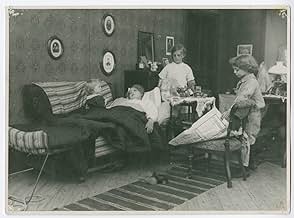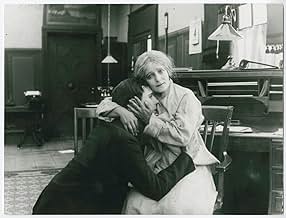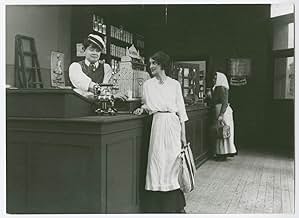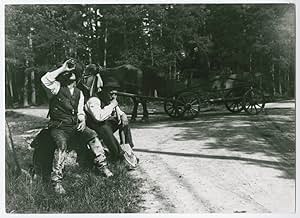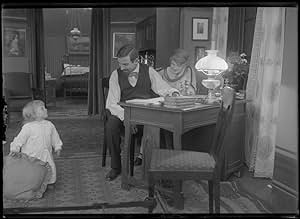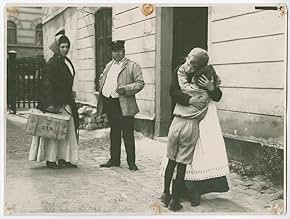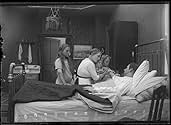CALIFICACIÓN DE IMDb
7.0/10
1.6 k
TU CALIFICACIÓN
Agrega una trama en tu idiomaFinancial struggles separate a single mother from her children.Financial struggles separate a single mother from her children.Financial struggles separate a single mother from her children.
- Dirección
- Guionistas
- Elenco
- Dirección
- Guionistas
- Todo el elenco y el equipo
- Producción, taquilla y más en IMDbPro
Opiniones destacadas
Victor Sjöström's early feature film "Ingeborg Holm" is not only considered by many the first film in the golden age of Swedish cinema lasting from 1913 to 1924 but also the real beginning of Swedish cinema in general. A film scholar, Peter Cowie, for one, claims that the film marks the highest achievement of the seventh art before David Wark Griffith's "The Birth of a Nation" (1915) which was to follow two years after. Although "Ingeborg Holm" is not as well known as many of its contemporary films, it surely stands out from the crowd to anyone who has seen more than a few films from the period. "Nothing like this was being made in 1913," writes Peter von Bagh, a Finnish film historian, capturing the historical importance of the film. The film's authenticity, realism, and moral seriousness have even been seen to bear far-reaching connections to Italian neorealism.
As many of the films of the Swedish golden age, "Ingeborg Holm" is also based on a literary source. It is based on a play by Nils Krok. The story concerns a married woman, Ingeborg Holm whose husband dies just after earning credit for establishing his own business. After the death of her husband, Ingeborg falls to the bottom of the society, loses her children to foster parents, and eventually ends up in an asylum.
The film is very raw and poignant in showing the grim consequences of social actions. It never, however, turns its back on the individual. Although it can be seen as a story of one woman's abasement, it grows into an intimate treatise on the sickness of a society that lacks humanity and tenderness. The shot of Ingeborg losing her children as a bureaucratic official calmly signs the documents in the background is definitive to say the least. The social reality as well as the psychological turmoil and suffering ignored by the society are relayed in a stark and riveting fashion. The scene bears a visual parallel to an earlier scene in which Ingeborg's husband dies in the foreground, while their children are innocently playing in the background of the image -- in another space, almost as if in another time, too.
Already the first film of the movement gives us its basic lessons: acting is more realistic than theatrical (to as large an extent as one can imagine given the film was made in 1913), moral themes are presented with the utmost seriousness, and emphasis lies on the simplicity and careful precision of mise-en-scène. Above all, the power of light is vital which was to be consummated in Sjöström's subsequent films such as "Terje Vigen" (1917) and "Körkarlen" (1921). In the beginning of the film, Ingeborg tries to continue her late husband's business, but fails, and we see the darkness in the grocery store almost swallowing her whole from the scarce source of light in the space.
Overall, and quite surprisingly, "Ingeborg Holm" lacks a sentimental or overly melodramatic tone. Sjöström's tone is subtle and restraint which once again reminds one of Italian neorealism. Although the film has no drama of nature which one so closely associates with the golden age of Swedish cinema, it uses a lot of outdoor on-location shooting, and its grimness, sobriety, and artistic excellence bring the style of the movement to mind very vividly. All in all, the film stands as a perfect instance for Peter Cowie's seemingly exaggerated claim that "there is no more stirring feat in the entire history of silent film than the Swedish achievements between 1913 and 1921." Sjöström's "Ingeborg Holm" is precisely this to any film enthusiast: something utterly stirring.
As many of the films of the Swedish golden age, "Ingeborg Holm" is also based on a literary source. It is based on a play by Nils Krok. The story concerns a married woman, Ingeborg Holm whose husband dies just after earning credit for establishing his own business. After the death of her husband, Ingeborg falls to the bottom of the society, loses her children to foster parents, and eventually ends up in an asylum.
The film is very raw and poignant in showing the grim consequences of social actions. It never, however, turns its back on the individual. Although it can be seen as a story of one woman's abasement, it grows into an intimate treatise on the sickness of a society that lacks humanity and tenderness. The shot of Ingeborg losing her children as a bureaucratic official calmly signs the documents in the background is definitive to say the least. The social reality as well as the psychological turmoil and suffering ignored by the society are relayed in a stark and riveting fashion. The scene bears a visual parallel to an earlier scene in which Ingeborg's husband dies in the foreground, while their children are innocently playing in the background of the image -- in another space, almost as if in another time, too.
Already the first film of the movement gives us its basic lessons: acting is more realistic than theatrical (to as large an extent as one can imagine given the film was made in 1913), moral themes are presented with the utmost seriousness, and emphasis lies on the simplicity and careful precision of mise-en-scène. Above all, the power of light is vital which was to be consummated in Sjöström's subsequent films such as "Terje Vigen" (1917) and "Körkarlen" (1921). In the beginning of the film, Ingeborg tries to continue her late husband's business, but fails, and we see the darkness in the grocery store almost swallowing her whole from the scarce source of light in the space.
Overall, and quite surprisingly, "Ingeborg Holm" lacks a sentimental or overly melodramatic tone. Sjöström's tone is subtle and restraint which once again reminds one of Italian neorealism. Although the film has no drama of nature which one so closely associates with the golden age of Swedish cinema, it uses a lot of outdoor on-location shooting, and its grimness, sobriety, and artistic excellence bring the style of the movement to mind very vividly. All in all, the film stands as a perfect instance for Peter Cowie's seemingly exaggerated claim that "there is no more stirring feat in the entire history of silent film than the Swedish achievements between 1913 and 1921." Sjöström's "Ingeborg Holm" is precisely this to any film enthusiast: something utterly stirring.
The Holms are a happy Swedish family who live an easy bourgeoisie life. In order to further improve their living, Herr Sven Holm requests a line of credit in the amount of 10.000 kronor in order to open a grocery shop.
Unfortunately things will change drastically for the Holms when Herr Sven falls ill with tuberculosis and dies. The grocery store, in the meanwhile, was left improperly unattended by an employee. Frau Ingeborg Holm is left bankrupt and alone with her three small children. This forces her to ask for help in a poorhouse.
Sweden has contributed to mankind some debatable inventions. For example, there's the safe but unstylish tank automobiles made in that Northern country ( nothing in common with elegant "Hispano-Suiza" cars )... or.. that modernen and consequently, ugly furniture manufactured in pieces that the buyer must to try to assemble ( ah, the "Rococo" overloaded style! ) ...or ...with not a trace of a four string quartets, the Swedish instead tormented aristocracy with bands of four longhaired youngsters singing tunes that even today are popular among commoners But certainly the most important Swedish contribution to the whole world was Social Security for their population via a program that provides protection to their commoners with unemployment insurance, poverty protection and pensions, among others. It's a public welfare state that other countries will model years later.
But unfortunately things weren't always that way as Herr Victor Sjöström depicted in his early silent film "Ingeborg Holm", directed by the Swedish director in the silent year of 1913.
The film was based on a play by Herr Nils Krok, who can be seen posing as the film starts in an elegant old photograph ( nothing in common with the coloured ones that the youngsters put in their modernen profiles ). The picture version tells the human tragedy of Frau Ingeborg Holm, who due to circumstances and the blows of fate, will face destitution. Her personal drama is worsened by the unsympathetic and strict poorhouse rules that during the last centuries were applied by Swedish officialdom.
Herr Sjöström admirably depicts the process of loss that affects Frau Holm's life and her desperation, abandonment, helplessness and finally insanity. It's a terrible sad odyssey that Frau Holm will suffer and includes making heartbreaking decisions such as when she is forced to put her children in an orphanage.
Certainly "Ingeborg Holm" is not an easy film. It is an uncomfortable drama in which Herr Sjöström denounces in a realistic and harsh way the injustice caused by strict central government laws that have no concern for their subjects.
Such bitterer sensations continue during the whole film climaxing at the end of the picture when Frau Holm, after 15 years, reunites again with one of her sons. This is a wonderful scene full of infinite sadness and very moving ( at this point it must be said that the original music score composed and performed by Herr David Drazin for the longhaired "Kino" modernen disc edition, is absolutely touching and elegant ).
But this is not a happy ending because there is no comfort in this reunion; there is not a chance in recovering the happy old days when times were better for Frau Holm and her three children. Instead Frau Holm has lived a miserable life in where everything she had and loved was destroyed. Herr Sjöström depicts a desperate, hard and moving portrait of a ruined life.
And now, if you'll allow me, I must temporarily take my leave because this German Count must pay a visit to his aristocratic fostered parents.
Unfortunately things will change drastically for the Holms when Herr Sven falls ill with tuberculosis and dies. The grocery store, in the meanwhile, was left improperly unattended by an employee. Frau Ingeborg Holm is left bankrupt and alone with her three small children. This forces her to ask for help in a poorhouse.
Sweden has contributed to mankind some debatable inventions. For example, there's the safe but unstylish tank automobiles made in that Northern country ( nothing in common with elegant "Hispano-Suiza" cars )... or.. that modernen and consequently, ugly furniture manufactured in pieces that the buyer must to try to assemble ( ah, the "Rococo" overloaded style! ) ...or ...with not a trace of a four string quartets, the Swedish instead tormented aristocracy with bands of four longhaired youngsters singing tunes that even today are popular among commoners But certainly the most important Swedish contribution to the whole world was Social Security for their population via a program that provides protection to their commoners with unemployment insurance, poverty protection and pensions, among others. It's a public welfare state that other countries will model years later.
But unfortunately things weren't always that way as Herr Victor Sjöström depicted in his early silent film "Ingeborg Holm", directed by the Swedish director in the silent year of 1913.
The film was based on a play by Herr Nils Krok, who can be seen posing as the film starts in an elegant old photograph ( nothing in common with the coloured ones that the youngsters put in their modernen profiles ). The picture version tells the human tragedy of Frau Ingeborg Holm, who due to circumstances and the blows of fate, will face destitution. Her personal drama is worsened by the unsympathetic and strict poorhouse rules that during the last centuries were applied by Swedish officialdom.
Herr Sjöström admirably depicts the process of loss that affects Frau Holm's life and her desperation, abandonment, helplessness and finally insanity. It's a terrible sad odyssey that Frau Holm will suffer and includes making heartbreaking decisions such as when she is forced to put her children in an orphanage.
Certainly "Ingeborg Holm" is not an easy film. It is an uncomfortable drama in which Herr Sjöström denounces in a realistic and harsh way the injustice caused by strict central government laws that have no concern for their subjects.
Such bitterer sensations continue during the whole film climaxing at the end of the picture when Frau Holm, after 15 years, reunites again with one of her sons. This is a wonderful scene full of infinite sadness and very moving ( at this point it must be said that the original music score composed and performed by Herr David Drazin for the longhaired "Kino" modernen disc edition, is absolutely touching and elegant ).
But this is not a happy ending because there is no comfort in this reunion; there is not a chance in recovering the happy old days when times were better for Frau Holm and her three children. Instead Frau Holm has lived a miserable life in where everything she had and loved was destroyed. Herr Sjöström depicts a desperate, hard and moving portrait of a ruined life.
And now, if you'll allow me, I must temporarily take my leave because this German Count must pay a visit to his aristocratic fostered parents.
The classic narrative films so familiar in "The Golden Age of Hollywood" movies had its beginning in October 1913 with Sweden's "Ingeborg Holm." Writer/director Victor Sjostrom adapted the Nils Krok 1906 play about a family who sinks to the depths of poverty after the father dies just as he assumes ownership of a store.
What sets "Ingeborg Holm" apart from the movies produced previously to the autumn of 1913 was the breath of its plot. Instead of taking a slice of a full-scale biography of the characters and producing a film on one particular stand alone event, here Sjostrom portrays an entire family's history, beginning when the head of the household receives bank funding to begin his enterprise. He continues the plot until years later, concluding in an emotional reunion with the mother and her long-absent son.
"Ingeborg Holm" fits all the criteria in cinema's full narrative definitions. A classic narrative begins by introducing all the characters who will propel the plot forward, just as Sjostrom illustrated with the comfortable middle-class family embarking on its new enterprise. Narratives contain a triggering event which shakes things up. Here, the father dies and his assistant at the store rips off the family's profits. Sjostrom continues the narrative plot by showing the mother-led family sinking into poverty, with the kids shunt off to the poor house. Events lead up to the conclusion, where the director visually reveals Sweden's lack of a safety net for the country's poor caused by, through no fault of themselves, their hardships.
Hollywood would follow Sjostrom's pattern of full narrative movies, especially during its classic 1930's--1950's golden age. There are variations of the narrative pattern in movies today, but the Swedes were the first to put into practice on film what literature and drama had been delivering for centuries.
Today's movie viewers may be familiar with Sjostrom by his last appearance on the screen in Ingmar Bergman's 1957's "Wild Strawberries," where he had the leading role of an aging professor who rediscovers his past through a journey to receive a honorarium.
What sets "Ingeborg Holm" apart from the movies produced previously to the autumn of 1913 was the breath of its plot. Instead of taking a slice of a full-scale biography of the characters and producing a film on one particular stand alone event, here Sjostrom portrays an entire family's history, beginning when the head of the household receives bank funding to begin his enterprise. He continues the plot until years later, concluding in an emotional reunion with the mother and her long-absent son.
"Ingeborg Holm" fits all the criteria in cinema's full narrative definitions. A classic narrative begins by introducing all the characters who will propel the plot forward, just as Sjostrom illustrated with the comfortable middle-class family embarking on its new enterprise. Narratives contain a triggering event which shakes things up. Here, the father dies and his assistant at the store rips off the family's profits. Sjostrom continues the narrative plot by showing the mother-led family sinking into poverty, with the kids shunt off to the poor house. Events lead up to the conclusion, where the director visually reveals Sweden's lack of a safety net for the country's poor caused by, through no fault of themselves, their hardships.
Hollywood would follow Sjostrom's pattern of full narrative movies, especially during its classic 1930's--1950's golden age. There are variations of the narrative pattern in movies today, but the Swedes were the first to put into practice on film what literature and drama had been delivering for centuries.
Today's movie viewers may be familiar with Sjostrom by his last appearance on the screen in Ingmar Bergman's 1957's "Wild Strawberries," where he had the leading role of an aging professor who rediscovers his past through a journey to receive a honorarium.
In conjunction with its release of THE OUTLAW AND HIS WIFE, Kino has also given us this splendid double bill from Victor Sjostrom (Seastrom in America) who was truly one of the world's great directors. His influence on other Scandinavian filmmakers (Ingmar Bergman and Carl Theodor Dreyer to name two of the best known) is clearly evident although with INGEBORG HOLM (1913) you could say he influenced many others as well. This film is incredibly well made for a film of its vintage. Although the camerawork is first rate it's the restrained naturalistic style of the acting by star Hilda Borgstrom along with the seriousness of the thematic material that really makes you sit up and take notice.
D. W. Griffith had explored social themes in his Biograph shorts before this but never in a feature length film and similar socially concious movies like TRAFFIC IN SOULS (also 1913) were not as dramatically sophisticated. The story of a widow whose husband leaves her bankrupt and is forced to live in a workhouse where she must give up her children to foster parents, works as both social indictment and dramatic tragedy. It's hard to watch this film and not become emotionally involved in the plight of the title character. The score by David Drazin is simple but effective using primarily piano with a few synthesized strings.
The other film on the disc, A MAN THERE WAS, dates from 1917 and is based on an epic poem (TERJE VIGEN) from the great Norwegian dramatist Henrik Ibsen (PEER GYNT). The English title cards are even an approximation of his poetic writing style which may be tough going for some but they add quite a bit to the visual narrative. Full of lots of natural location shooting including the open sea, MAN explores a variety of powerful emotions as a fisherman during the Napoleonic Wars is wrongfully imprisoned which results in the death of his family.
Many years after his release he is presented with the opportunity of saving the family of the man who sent him to prison. Donald Sosin's piano score is very effective especially during the sea sequences but it would have been nice to have a chamber or orchestral score to accompany the film. Nevertheless this is an important set from one of the great early film pioneers and as such should not be missed...For more reviews visit The Capsule Critic.
D. W. Griffith had explored social themes in his Biograph shorts before this but never in a feature length film and similar socially concious movies like TRAFFIC IN SOULS (also 1913) were not as dramatically sophisticated. The story of a widow whose husband leaves her bankrupt and is forced to live in a workhouse where she must give up her children to foster parents, works as both social indictment and dramatic tragedy. It's hard to watch this film and not become emotionally involved in the plight of the title character. The score by David Drazin is simple but effective using primarily piano with a few synthesized strings.
The other film on the disc, A MAN THERE WAS, dates from 1917 and is based on an epic poem (TERJE VIGEN) from the great Norwegian dramatist Henrik Ibsen (PEER GYNT). The English title cards are even an approximation of his poetic writing style which may be tough going for some but they add quite a bit to the visual narrative. Full of lots of natural location shooting including the open sea, MAN explores a variety of powerful emotions as a fisherman during the Napoleonic Wars is wrongfully imprisoned which results in the death of his family.
Many years after his release he is presented with the opportunity of saving the family of the man who sent him to prison. Donald Sosin's piano score is very effective especially during the sea sequences but it would have been nice to have a chamber or orchestral score to accompany the film. Nevertheless this is an important set from one of the great early film pioneers and as such should not be missed...For more reviews visit The Capsule Critic.
A woman loses her husband and children in quick succession as the hand of fate lands her a tragic blow. Good direction, cinematography and acting for the time make this one of the essential silents and a standout in Scandinavian and world cinema. A must for fans of film history and movies in general.
¿Sabías que…?
- TriviaNoted as the first true narrative film, its remarkable narrative continuity would characterize the style now known as classical Hollywood, which dominated the global film industry for the majority of the century.
- ConexionesFeatured in Victor Sjöström - ett porträtt av Gösta Werner (1981)
Selecciones populares
Inicia sesión para calificar y agrega a la lista de videos para obtener recomendaciones personalizadas
Detalles
- Tiempo de ejecución
- 1h 36min(96 min)
- Mezcla de sonido
- Relación de aspecto
- 1.33 : 1
Contribuir a esta página
Sugiere una edición o agrega el contenido que falta

